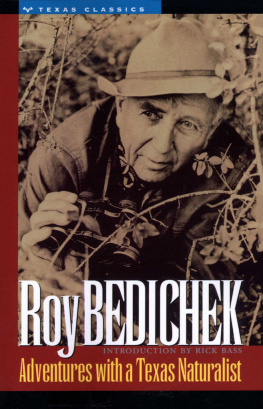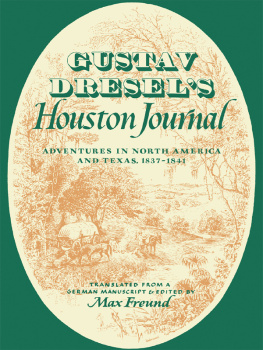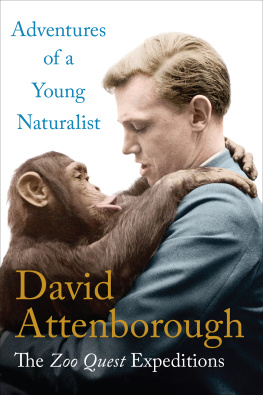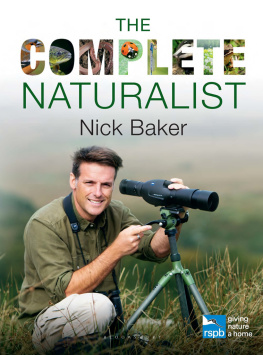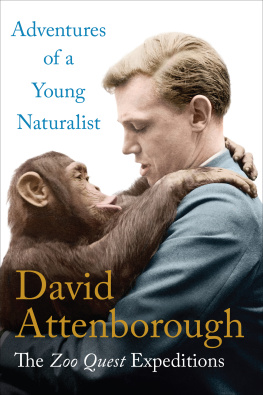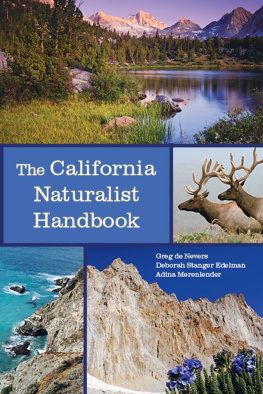Roy Bedichek - Adventures with a Texas Naturalist
Here you can read online Roy Bedichek - Adventures with a Texas Naturalist full text of the book (entire story) in english for free. Download pdf and epub, get meaning, cover and reviews about this ebook. year: 1975, publisher: University of Texas Press, genre: Art. Description of the work, (preface) as well as reviews are available. Best literature library LitArk.com created for fans of good reading and offers a wide selection of genres:
Romance novel
Science fiction
Adventure
Detective
Science
History
Home and family
Prose
Art
Politics
Computer
Non-fiction
Religion
Business
Children
Humor
Choose a favorite category and find really read worthwhile books. Enjoy immersion in the world of imagination, feel the emotions of the characters or learn something new for yourself, make an fascinating discovery.
- Book:Adventures with a Texas Naturalist
- Author:
- Publisher:University of Texas Press
- Genre:
- Year:1975
- Rating:5 / 5
- Favourites:Add to favourites
- Your mark:
- 100
- 1
- 2
- 3
- 4
- 5
Adventures with a Texas Naturalist: summary, description and annotation
We offer to read an annotation, description, summary or preface (depends on what the author of the book "Adventures with a Texas Naturalist" wrote himself). If you haven't found the necessary information about the book — write in the comments, we will try to find it.
A classic since its first publication in 1947, Adventures with a Texas Naturalist distills a lifetime of patient observations of the natural world.
Adventures with a Texas Naturalist — read online for free the complete book (whole text) full work
Below is the text of the book, divided by pages. System saving the place of the last page read, allows you to conveniently read the book "Adventures with a Texas Naturalist" online for free, without having to search again every time where you left off. Put a bookmark, and you can go to the page where you finished reading at any time.
Font size:
Interval:
Bookmark:
To my father, a gentle philosopher, who, by both precept and example, taught me, a little savage, to love animals.

Adventures with a Texas Naturalist
ROY BEDICHEK
With a new introduction by Rick Bass
Illustrations by WARD LOCKWOOD
Foreword by H. MEWHINNEY

UNIVERSITY OF TEXAS PRESS
AUSTIN
ISBN: 978-0-292-70311-7
Library of Congress Catalog Card Number 61-12914
First edition copyright 1947 by Roy Bedichek
New (revised) edition copyright 1961 by Lillian G. Bedichek, renewed 1989
Introduction copyright 1994 by Rick Bass
All rights reserved
Seventh paperback printing, 2004
Requests for permission to reproduce material from this work should be sent to Permissions, University of Texas Press, Box 7819, Austin, Texas 78713-7819.
ISBN 978-0-292-75704-2 (e-book)
ISBN 978-0-292-79199-2 (individual e-book)
DOI 10.7560/731554
Introduction by Rick Bass
Almost any Texan, and any writer or reader or naturalist interested in that region, has heard of the literary cornerstone laid down there by J. Frank Dobie, Walter Prescott Webb, and Roy Bedichek in the early and middle part of this century. The three old boys were friends. I understand that they drank whiskey and sometimes ate meat and lolled around campfires and got all passionate about nearly everything, but always about art and about natureabout Shakespeare and warblers, about Odysseus and catfish. They hung out together in what I believe is one of the very sweetest and best parts of the state, the Hill Country, during what was a sweet and good, if bittersweet, time in that countrys natural history.
Although the country and its species had been pretty much discovered and explored and named up, they had not yet been bruised irreparably by the brutish impositions of fragmentation and destruction. You could still hold out hope, even belief, that a lone black jaguar might occasionally wander the remote stretches of the Pedernales. It was not uncommon to know someone who had known the Comanches, or to lay eyes upon an old man or woman who had laid eyes upon the last free herds of bison. There were still wolves in Texas thenred wolves, Mexican lobos, and gray wolvesand you could still find people who had come across grizzlies in West Texas.
These thingsthis bedrock wildness, and bedrock markers of a regions cultural as well as natural identityhad vanished only so recently that they were still right at the edge of time and being; even if they were gone, their presence was still felt, was still resonant. There was not the yellowing-newspaper quality to these things that there is now. They had been gone only so recently that perhaps it even seemed possible they might come back any day.
I knew more about Dobie and Webb than I did about Bedichek. Dobies importance to the state of knowledge in Texasespecially folkloreis well documented, well preserved, as is Webbs, due mostly to his landmark work, The Great Plains. Its this third dead white male, howeverBedichekwho in my opinion seems less preserved, less known and read, and that represents a real loss, not just to present and future Texans but to the worldwide community of readers.
Born in the nineteenth century, Bedichek created work that will step across into the twenty-first. It chronicles what was there in the Hill Country at that time, during a single year of his musing and literary stock-gathering. But beyond the works simple value as data-load (the commonality of Vermilion Flycatchers back then; the presence and habits of Golden-cheeked Warblers, etc.), the book stands to enrich us with the clear passion of itself. To me it has as much strength and message, if not readership, as Leopolds A Sand County Almanac or Thoreaus Walden.
One of the things thats most amazing and encouraging to me is how gleefully politically incorrect Bedichek was, even back then: not for the sake of incorrectness itself, but for the simple sake of passion and freethinking.
Muir and Thoreau wrote out of an Emersonian tradition where God is often the face of Nature. They wrote in a time and a country where Bierstadts glory-sunsets were accepted as being nothing other than the back door into heaven. Because of this favorable milieu, their passionate writing, while still the best of its kind, carries to me a bit of the scent of the free-glide, the easy-way-home. Writers such as Muir and Thoreau were visionaries, true, and two of the most original thinkers our country has ever hadbut still, they were working in fairly advantageous intellectual environments.
When Bedichek did his freethinking, and embraced just as unabashedly as Muir and Thoreau the golden face of Nature-as-God, the milieu for this kind of thing was much harsher. There was a backlash of objective scientism going on at the timea reaction that lasts to this day. It was being taught that you cant be a good scientist or naturalist if you love or have passion for your subject. Thats finally starting to change, thank goodness, as scientists are remembering that science is about discovery, and that the best discoveries come out of hunger, and that it is a greater danger to be too distanced from your subject than to be too closeand that above all, were human, and cant repress our essence, our passions, anyway. But back when Bedichek was watching and writing about and trying to make sense of nature (or rather, trying to understand the sense already in nature), that was not the way peopleespecially scientiststhought.
Earlier in the century there had been much ridiculing going on about the nature-fakerspeople who waxed poetic, who let their hearts burn aflame with the wild, their hearts bursting into poetic incandescence at the slightest breeze. The glint of sun off a single dragonflys wings might be enough to send them into a paroxysm of nature-embrace and proclamations to Gods and Heavens miracles.
To be sure, quite a bit of nature-fakery continuedpeople pretending to have feelings or insights they didnt really havebut in our typically American way, anyone who got anywhere near that stereotype was lumped in as a nature-faker and dismissed as being passionate and therefore meaningless.
None of this evidently meant anything to Bedichek. He just wrote his heart out and spoke that strong double-dose mix of passion and intellect, unafraid or unconcerned of who might lump him where. Which is of course why, as they say in academic circles, he has survived.
So he was not timid or cowardly in his admissions of love for the land; he was not afraid to observe and then propose that geese, for example, are capable of feeling joy and exhilaration.
The irony is that Bedichek was such a good, and sorely missed, naturalist. He seemed to have a born instinct as to when to be an artistwhen to open his heart, his passions, his emotions, to take flightand when to walk the steady line and be the good scientist, to simply take good notes, gather good data.
He was meticulous about tracking down the sources and thought patterns that gave rise to folklore and dissecting them all the way to their essence in order to give a proper evaluation. He observed and studied everything, it seems, but especially the birds, from the apparently random cawing of crows to the perching habits of goldfinches versus those of sparrows. Early in this book, he records with a macabre, unblinking precision the ancient act of a snake swallowing a frog. Bedichek the artist knows how to start a good story:
One afternoon a distress-croak attracted my attention and, looking about a bit, I found in a patch of weeds near the pond a young frog struggling to free himself from a snake...
Next pageFont size:
Interval:
Bookmark:
Similar books «Adventures with a Texas Naturalist»
Look at similar books to Adventures with a Texas Naturalist. We have selected literature similar in name and meaning in the hope of providing readers with more options to find new, interesting, not yet read works.
Discussion, reviews of the book Adventures with a Texas Naturalist and just readers' own opinions. Leave your comments, write what you think about the work, its meaning or the main characters. Specify what exactly you liked and what you didn't like, and why you think so.

